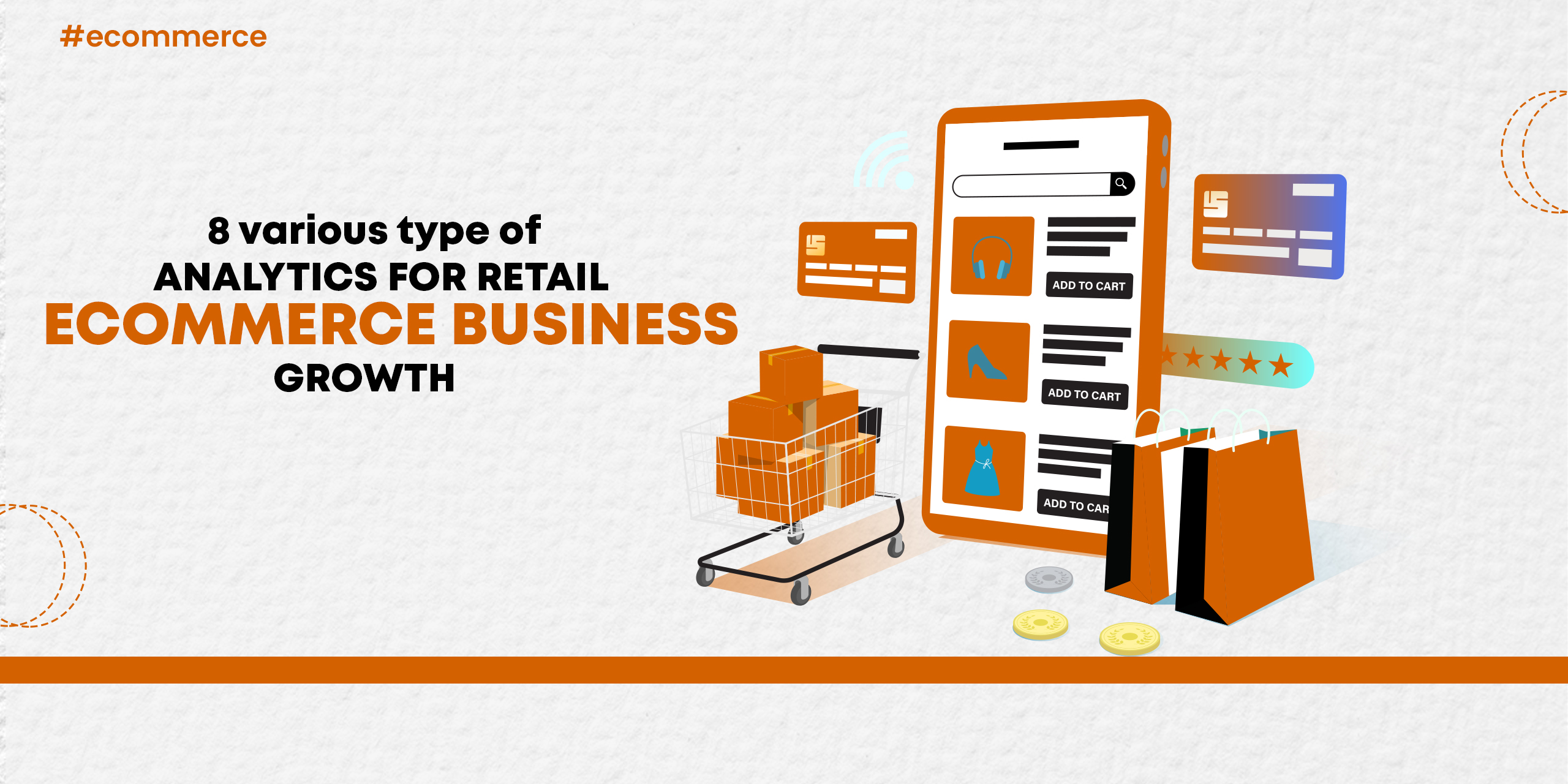In the ever-evolving landscape of retail e-commerce, businesses are increasingly relying to gain valuable insights and drive growth. Some key factors play an important role in shaping strategic decisions, optimising operations, and enhancing customer experiences.
In the digital era, data has become a powerful tool for businesses seeking to enhance their operations and boost profitability. Retail and e-commerce, in particular, benefits from various types of factors that provide valuable insights into customer behaviour, sales patterns, and market trends.
In this comprehensive exploration, we delve into eight key analytics that hold the potential to propel e-commerce retail businesses that can significantly contribute to the growth of businesses.
significance of Retail E-Commerce
it plays an important role in driving business growth, and its significance can be attributed to several key factors like:
Global Market Reach:
One of the primary advantages of e-commerce retail for business growth is the ability to tap into a global market. e-commerce platforms provide businesses with the opportunity to reach a vast and diverse audience worldwide. This global exposure not only increases sales potential but also allows businesses to diversify and reduce dependence on a single market.
24/7 Accessibility and Convenience:
Retail e-commerce enables businesses to operate 24/7, offering products and services to customers at any time of the day. This constant accessibility is a significant driver of business growth as it caters to the changing consumer behaviours and preferences.
Data-Driven Decision Making:
E-commerce platforms generate data that businesses can make informed decisions. This data-driven approach allows businesses to understand their customers better, optimise marketing strategies, personalise the shopping experience, and tailor their product offerings.
The significance of retailing in e-commerce for business growth lies in its ability to facilitate global market reach, provide 24/7 accessibility and convenience to customers, and empower data-driven decision-making processes.
8 Key Analytics of Retail E- Commerce for business Growth
Analytics plays an important role in the growth and success of e-commerce retail businesses. Here are eight various types of analytics that can significantly impact business growth:
Web Analytics: Navigating the Digital Landscape
In the digital age, understanding website traffic and user behaviour is crucial. Web analytics tools, such as Google Analytics, provide valuable insights into the performance of your online platform. By tracking visitor interactions and analysing data, businesses can make informed decisions to enhance the user experience.
Customer Analytics: Tailoring Experiences
To thrive in the competitive e-commerce retail field, businesses must understand their customers deeply. Customer analytics enables the collection and analysis of data related to customer behaviour and preferences. Armed with this information, businesses can personalise marketing strategies, recommend products, and foster long-term customer loyalty.
Sales Analytics: Unveiling Performance Trends
Analysing sales data goes beyond revenue numbers. Sales analysis delves into performance trends, identifying top-selling products and optimising inventory management. By understanding sales patterns, retail e-commerce ventures can make data-driven decisions to maximise profits and meet customer demands effectively.
Social Media Analytics: Harnessing the Power of Social Platforms
In a world dominated by social media, leveraging analytics on platforms like Facebook, Instagram, and Twitter is essential. Social media analytics provides insights into campaign effectiveness, audience engagement, and brand sentiment. This data empowers businesses to refine their social media strategies for maximum impact.
Mobile Analytics: Optimising the Mobile Shopping Experience
As mobile usage continues to rise, e-commerce retailers must prioritise mobile analytics. This involves analysing data specific to mobile users, ensuring a seamless and enjoyable shopping experience. Mobile analysis helps identify trends, preferences, and potential areas for improvement in the mobile interface.
Predictive Analytics: Anticipating Future Trends
Predictive analysis takes retailing in e-commerce to the next level by forecasting future trends and customer behaviour. By analysing historical data, businesses can make informed predictions, allowing for proactive decision-making. These e-commerce retailers stay ahead of the curve and adapt strategies to changing market dynamics.
Supply Chain Analytics: Streamlining Operations
Efficient supply chain management is a cornerstone of successful retail e-commerce. Supply chain involves analysing data to optimise logistics, reduce costs, and improve overall efficiency. Businesses can make strategic decisions based on this analysis, ensuring a smooth and cost-effective flow from production to delivery.
Competitor Analytics: Staying Ahead of the Game
Monitoring competitors and industry trends is vital for sustained success. Competitor analysis allows businesses to benchmark their performance, identify opportunities for improvement, and stay ahead of industry trends. This data-driven approach positions businesses strategically in the market.
These various types of analytics, e-commerce retail businesses can gain valuable insights, optimise operations, and make informed decisions to drive growth and enhance the overall customer experience.
Summarising
The integration of various analytics types is essential for retail e-commerce businesses aiming for sustainable growth. From understanding customer behaviour to optimising supply chain operations, analytics empowers businesses to make informed decisions.
These strategies will not only enhance efficiency but also drive business success in the dynamic world of e-commerce.
Looking to revolutionise your e-commerce business? Look no further! Make Your Brands, a leading digital marketing agency, is here to boost your brand visibility and drive unprecedented growth.
Frequently Asked Questions.
E-commerce involves online transactions, while retail refers to traditional in-store sales. E-commerce offers convenience, global reach, and digital transactions, while retail provides hands-on shopping experiences.
Retail provides a hands-on shopping experience, immediate product availability, and the chance to interact with products before purchase. It also allows for in-person customer service.
Reputable e-commerce sites prioritise customer data security. They use encryption and other security measures to protect personal information. Always choose strong passwords and avoid sharing sensitive details.
Reputable e-commerce sites prioritise customer data security. They use encryption and other security measures to protect personal information. Always choose strong passwords and avoid sharing sensitive details.
Reputable e-commerce sites prioritise customer data security. They use encryption and other security measures to protect personal information. Always choose strong passwords and avoid sharing sensitive details.




